Choosing the right software solution for your business is crucial to streamline operations, boost productivity, and stay ahead in today’s competitive market. When it comes to software options, two common choices are off-the-shelf software and custom software development. In this blog post, we will dive deep into the pros and cons of each approach to help you make an informed decision. As a trusted custom software development company, Codepaper understands the importance of finding the right Off-the-Shelf vs. Custom Software solution tailored to your unique business needs.
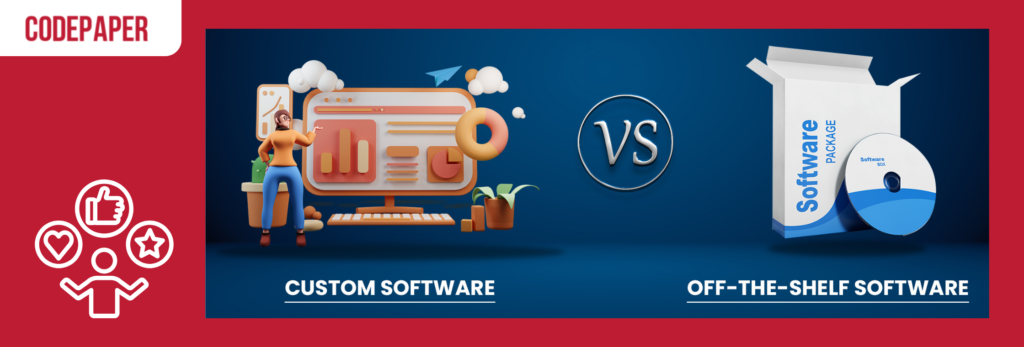
Off-the-Shelf Software
Definition and Overview: Off-the-shelf software refers to pre-packaged software solutions available for purchase and use without significant customization. These solutions are developed to cater to a wide range of businesses and industries, aiming to meet common needs and requirements.
Pros of Off-the-Shelf Software:
- Cost-Effectiveness: Off-the-shelf software is typically more affordable upfront as the development costs are distributed among multiple users. This makes it an attractive option for small businesses with limited budgets.
- Quick Deployment: With off-the-shelf software, you can start using the solution immediately as it is readily available. There is no need for extensive development time or waiting for customizations.
- Established Functionality: Off-the-shelf software often offers a range of features and functionalities that have been tried and tested by other users in similar industries. This means you can benefit from the experience and feedback of a larger user base.
Cons of Off-the-Shelf Software:
- Limited Customization: Off-the-shelf software may not fully align with your specific business processes or unique requirements since it is designed for a broader user base. Customization options are limited, and you may need to adapt your workflows to fit the software.
- Lack of Scalability: As your business grows and evolves, off-the-shelf software may not be able to adapt and scale to accommodate your changing needs. You may outgrow the software’s capabilities, leading to inefficiencies and the need for additional solutions.
- Potential for Redundant Features: Off-the-shelf software often includes features that you may not need, resulting in a cluttered user interface and unnecessary complexity. This can impact user experience and productivity.
Custom Software
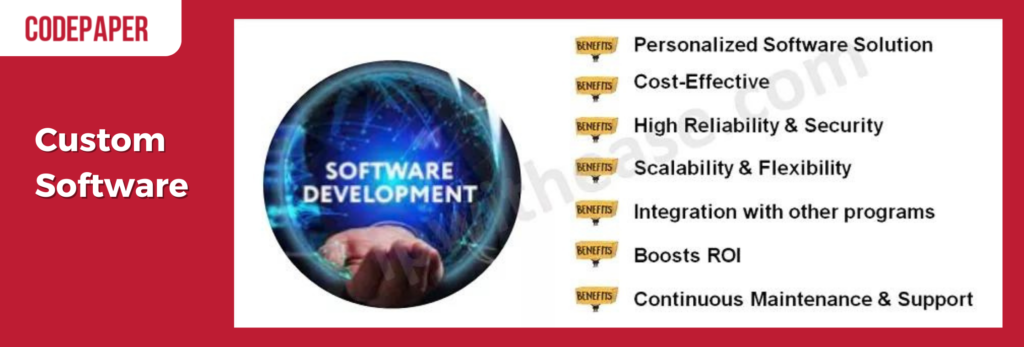
Definition and Overview: Custom software refers to software solutions specifically developed to address the unique needs and requirements of a particular business or industry. It is built from scratch and tailored to match specific workflows and processes.
Pros of Custom Software:
- Personalization: Custom software can be designed to fit your business processes precisely, resulting in improved efficiency and productivity. You have full control over the features, functionalities, and user interface, ensuring an optimal user experience.
- Scalability and Flexibility: Custom software is built with future growth in mind. It can easily adapt and grow with your business, accommodating changes and evolving requirements. This ensures long-term scalability and avoids the need for costly software migrations.
- Competitive Advantage: Custom software provides a unique competitive edge by offering features and functionalities that are not available in off-the-shelf solutions. It allows you to differentiate your business and deliver a more tailored experience to your customers.
Cons of Custom Software:
- Higher Initial Investment: Custom software development involves higher upfront costs compared to off-the-shelf solutions due to the development process and tailored nature of the software. However, it is essential to consider the long-term cost savings and ROI it can provide.
- Longer Development Time: Building custom software requires time for requirements gathering, design, development, and testing.
- Ongoing Maintenance and Support: Custom software requires dedicated maintenance and support to ensure optimal performance and address any issues that may arise. This includes regular updates, bug fixes, and compatibility with evolving technologies. It is important to have a plan in place for ongoing support and maintenance to keep the software running smoothly.
Comparison of Off-the-Shelf and Custom Software
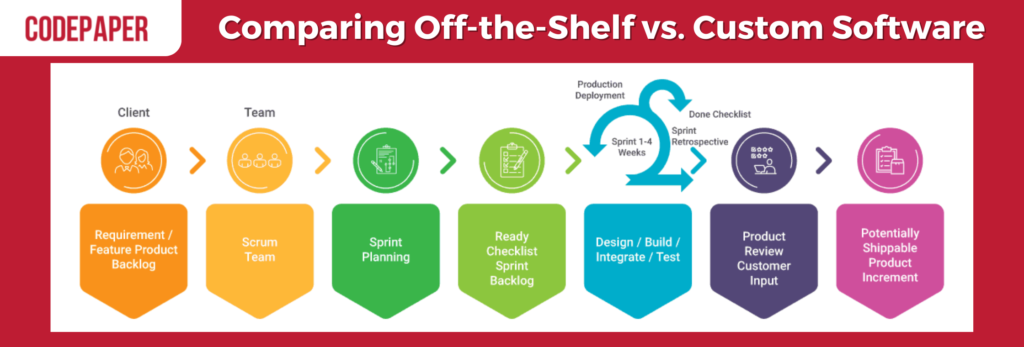
Cost
- Initial Investment: Off-the-shelf software is generally more cost-effective upfront, as the development costs are shared among multiple users. Custom software, on the other hand, requires a higher initial investment due to the tailored nature of the development process.
- Long-Term Cost: While off-the-shelf software may seem more affordable initially, custom software can provide long-term cost savings. With off-the-shelf software, you often need to pay for licenses and subscriptions, which can add up over time. Custom software eliminates these recurring costs.
Flexibility and Scalability
- Flexibility: Greater flexibility is offered by custom software, It designed for align with your specific business processes. It can adapt to your unique workflows, ensuring maximum efficiency. Off-the-shelf software, while flexible to some extent, may have limitations in customization.
- Scalability: Custom software is for scale with your business. It can accommodate your changing needs as you grow, ensuring that the software remains a valuable asset. Off-the-shelf software may have limitations in terms of scalability, potentially requiring additional solutions as your business expands.
Customization
- Customization: Custom software provides extensive customization options. The features, functionality, and user interface are under your control, enabling precise tailoring of the software. Off-the-shelf software has limited customization options, and you may need to adjust your processes to fit the software’s capabilities.
Integration
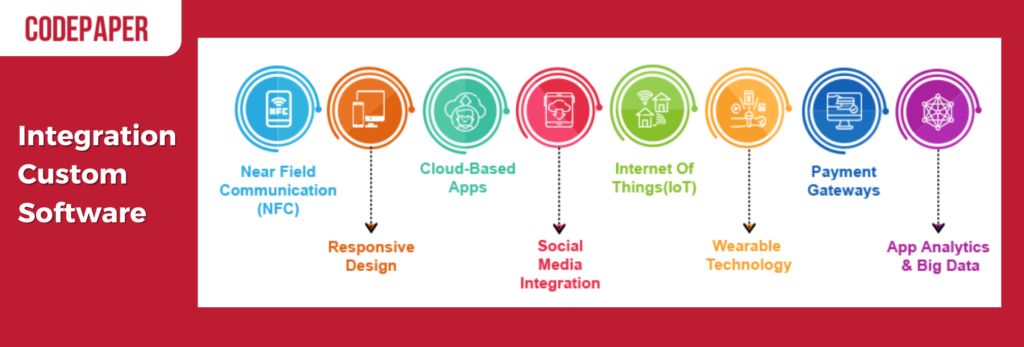
- Integration: Seamless integration of custom software with your existing systems and tools enables a cohesive and efficient workflow. Off-the-shelf software may require additional integration efforts, which can be time-consuming and costly.
Maintenance and Support
- Maintenance: Custom software requires ongoing maintenance and support to ensure its smooth operation. This includes regular updates, bug fixes, and enhancements. Off-the-shelf software often comes with regular updates and support from the vendor.
- Support: Custom software development companies like Codepaper can provide dedicated support tailored to your specific software. They have a deeper understanding of the software’s intricacies and can offer more personalized assistance. Support for off-the-shelf software may be more generalized.
Security
- Security: Custom software allows you to prioritize security and implement robust measures based on your specific requirements. Off-the-shelf software provides standard security features, but they may not fully meet your security needs.
Making the Right Choice

When deciding between off-the-shelf and custom software, consider the following factors:
- Assess your specific business needs and requirements.
- Evaluate the level of customization and flexibility you require.
- Consider the long-term scalability and growth of your business.
- Compare the upfront costs with long-term cost savings.
- Assess the importance of gaining a competitive advantage.
- Evaluate the level of ongoing maintenance and support required.
- Consider the security requirements of your business.
Real-World Examples
Provide examples of businesses that have benefited from each approach. For off-the-shelf software, you can mention how a small retail store implemented a popular point-of-sale software solution to streamline their sales process and inventory management. For custom software, highlight how a logistics company developed a custom software solution to optimize their supply chain operations, resulting in significant cost savings, improved delivery times, and enhanced customer satisfaction.
Conclusion
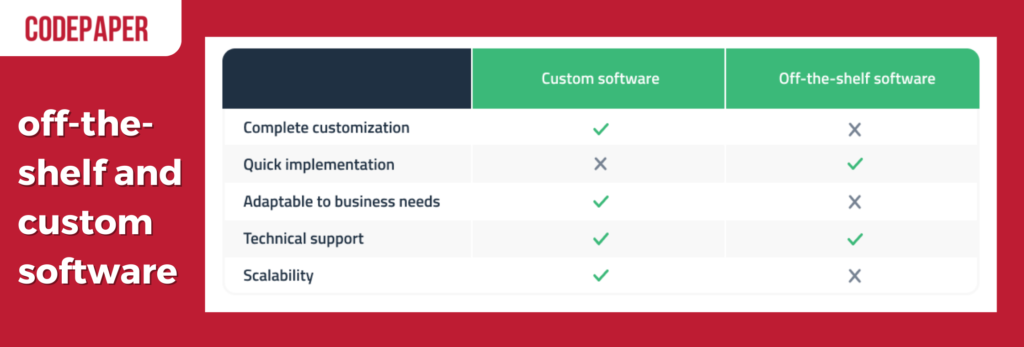
In conclusion, the choice between off-the-shelf and custom software depends on your specific business needs, budget, and long-term goals. Off-the-shelf software offers cost-effectiveness and quick deployment, making it suitable for businesses with limited budgets and immediate needs. However, it may lack the flexibility, scalability, and customization options that custom software provides.
Custom software development, offered by experts like Codepaper, offers the advantage of personalization, scalability, and a competitive edge. Although custom software involves a higher initial investment and longer development time, it offers long-term cost savings and the ability to adapt as your business evolves.
Customization and Scalability
When making a decision, assess your specific requirements, evaluate the level of customization and scalability you need, consider the long-term costs and benefits, and weigh the importance of gaining a competitive advantage. Additionally, consider the ongoing maintenance and support required and the security needs of your business.
At Codepaper, we specialize in custom software development and can help you navigate the decision-making process. Our experienced team can analyze your business needs, suggest the most suitable approach, and develop a customized software solution tailored to your requirements.
Whether you choose off-the-shelf software or custom software development, it is important to partner with a reputable and reliable software development company. Codepaper’s expertise in custom software development in Toronto ensures that your business receives the highest level of services and support throughout the software development lifecycle.
Make an informed decision that aligns with your business goals and partner with Codepaper for your software development needs. Contact us today to discuss how we can help your business thrive with customized software solutions.
Remember, when it comes to software solutions, one size does not fit all. Choose the option that best suits your business requirements and sets you up for success in the long run.

